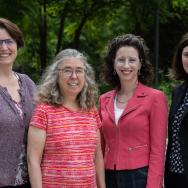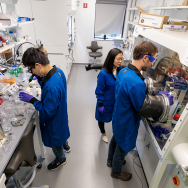The National Science Foundation has awarded $15.5 million to researchers at the University of Chicago over six years to establish a new field of physics that focuses on how living matter can store, retrieve, and process information.
Known as the Center for Living Systems, it is one of four newly funded National Science Foundation Physics Frontier Centers in 2023 nationwide and will be led by Margaret Gardel, the Horace B. Horton Professor of Physics and Molecular Engineering.
“We aim to establish a new field of physics that focuses on how living matter adapts to its environment on timescales ranging from milliseconds to billions of years,” said Gardel, director of the James Franck Institute and member of the Institute for Biophysical Dynamics. “This will both deepen our understanding of living systems and open opportunities for new technologies.”
“The new Center for Living Systems reflects UChicago’s tradition of defining new fields of science,” says Angela Olinto, dean of the Physical Sciences Division. “We are looking forward to the ground-breaking discoveries in the multidisciplinary approach to the physics of living systems.”
New avenues
Physicists have traditionally focused on materials in our physical, or non-living world—from understanding how they deform in response to external force to how electrical charge may be stored or moved around.
However, life is a form of matter that poses new questions and applications that haven’t yet been explored as deeply, the scientists said.
“Living matter continually changes its structure in response to its environment and evolves in an open-ended way, something that non-living matter typically does not do—even though both are subject to the same rules of physics,” said Arvind Murugan, an associate professor of physics and member of the James Franck Institute, who will serve as deputy director for the center.
The scientists believe the field of physics could offer unique approaches and insight to the study of biology; for example, many biological systems involve many players acting in concert, and physics has strong tools for understanding collective phenomena. Conversely, the principles of biology could suggest new avenues for physicists and engineers to explore.
A good example of complex living matter is the human immune system, the scientists said. The immune system performs very complex decision-making; it can’t fail to recognize a pathogen, but too many false alarms will also harm the body. “It must take in many signals, discard the noise, and respond both quickly and accurately,” said Gardel. “That’s an incredibly difficult task.”
There are many other examples that fall along similar lines: How does tissue sense where it’s been damaged and carry out repairs? How do organisms anticipate changes in sunlight using their internal circadian rhythm?
Interdisciplinary integration
The center will have three main areas of research, Gardel said. These include how evolution constructs living systems that are adaptable; how adaptation drives motility and other abilities; and how living systems process information in their environment.
The center includes both theoretical and experimental scientists and is designed to be inherently multidisciplinary—its 18 affiliated faculty members have appointments in the departments of physics, chemistry, genetics and cell biology, organismal biology and anatomy, statistics, ecology and evolution, molecular computer science, biochemistry and molecular biophysics, neurobiology, and molecular engineering. It will also collaborate with the UChicago-affiliated Argonne National Laboratory and the Marine Biological Laboratory, as well as with the French National Centre for Scientific Research.
An important component of the center will be to broaden physics education and outreach to the broader community. As an example, the center will expand diversity of physics curricula in K-12 through college levels by including more examples of research in different areas, including concepts developed by the center.
“We want to broaden the scope of physics to include living systems and share these findings with our community,” said Gardel.
"Research teams at NSF Physics Frontiers Centers have made breakthrough after breakthrough, such as creating remarkable new states of matter and revealing the first evidence for the gravitational wave background of the universe," said National Science Foundation director Sethuraman Panchanathan. "While different in their respective areas of focus, NSF's newly funded centers are all bold team efforts to punch through to exciting new vistas of scientific exploration. Achieving transformative opportunities requires us to reach those vistas through new technologies and other advances and have a look around."
More information can be found on the Center for Living Systems website.

